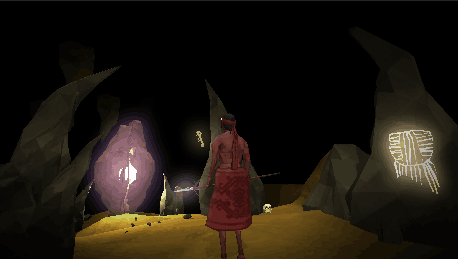Utilizing one of the unlikeliest mediums for cultural preservation, the team behind the videogame Mulaka hopes to bring awareness to the indigenous tribe that’s been living in Northwestern Mexico for centuries. According to the Kickstarter, the Rarámuri (or Tarahumara) people live simultaneously within and apart from modern culture, at times coexisting in metropolitan areas while also rejecting the conventions of contemporary lifestyles.
“Unfortunately, the treatment of the Rarámuri people (especially those living in the metropolitan areas of Chihuahua) could definitely be better,” says the Lienzo studio’s community leader Adolfo Aguirre. “People in the state of Chihuahua take great pride on this culture, but that isn’t enough to stop the endangerment of its people.”
Most Tarahumara people who live in cities, Aguirre explains, have resorted to begging or selling snacks on the streets. Most are children. “There is definitely a culture clash, or misunderstanding, in terms of why the Tarahumara community distances themselves from the rest of society.”
But the Rarámuri people have been fighting to keep their culture and practices alive for centuries now. Though today they are viewed as a passivist tribe, their history is full of fierce warriors who fought off powerful enemies like the Apaches and Conchos. They even managed to defend their lands from the Spaniards long enough for them to give up. “Which is why they’re still around to this date, preserving their way of life and refusing to conform to the modern world despite the fact that most call it a losing battle.”
Mulaka hopes to spotlight the resilient ferocity of the Rarámuri, by bringing their myths and legends to life in an action-adventure puzzler. Playing as the main character (who provides the game its namesake), players must battle mythological creatures that test Mulaka on his path to becoming a Shaman, or Sukuruame. As he battles evil to gain the trust of the Sierra Tarahumara demi-gods, Mulaka intercedes on behalf of humanity, whose lands are once again being threatened by the Sun, Moon, and Twilight gods.
The “gods above” of Rarámuri’s mythology, unlike the Christian God, doesn’t see humans as the nexus of creation, or even the center of it. “That’s why the gods above have destroyed the world three times in the past, to restart it and annul a vicious humanity.” Aside from valuing all life, whether small or infinite, the Rarámuri culture “also has no sense of ownership whatsoever, forbidding the concept of ‘owning’ land. Everything they have is shared and can only keep enough for themselves and their families,” Aguirre says.
In Chris McDougall’s book Born to Run, he describes his intimate experiences with the Rarámuri people and their values. As world-renowned marathon runners, the science behind the Rarámuri’s running skills have been studied extensively. But McDougall suggests a different aspect of their talent, attributing them more to spirit than science:
“You ran to eat and to avoid being eaten; you ran to find a mate and impress her, and with her you ran off to start a new life together. You had to love running, or you wouldn’t live to love anything else. And like everything else we love – everything we sentimentally call our “passions” and “desires” – it’s really an encoded ancestral necessity. We were born to run; we were born because we run. We’re all Running People, as the Tarahumara have always known.”
The Rarámuri people believe that men have three souls and women have four. Only the most skilled Sukuruame can help bring back a soul once it’s been lost, giving the player even more challenges to overcome along the way. As Mulaka, the game is narrated entirely in the Rarámuri lanaguage, as Mulaka traverses the beautiful land of Sierra Tarahumara fighting to save others’ souls using legendary magic and weapons.

“We’ve talked so far with three major Tarahumara communities and, though they were definitely doubtful at first, they’re enjoying how our game treats their culture with the utmost respect. They’re all for it now,” says Aguirre. “We believe games can be tools to change society for good, and want to raise awareness of the beauty and colors of the Rarámuri culture through our game.”
You can help support the creation of Mulaka over on Kickstarter. Though the Lienzo team hopes to be done by summer 2016, they’re aiming for an early access release only seven months into development.
